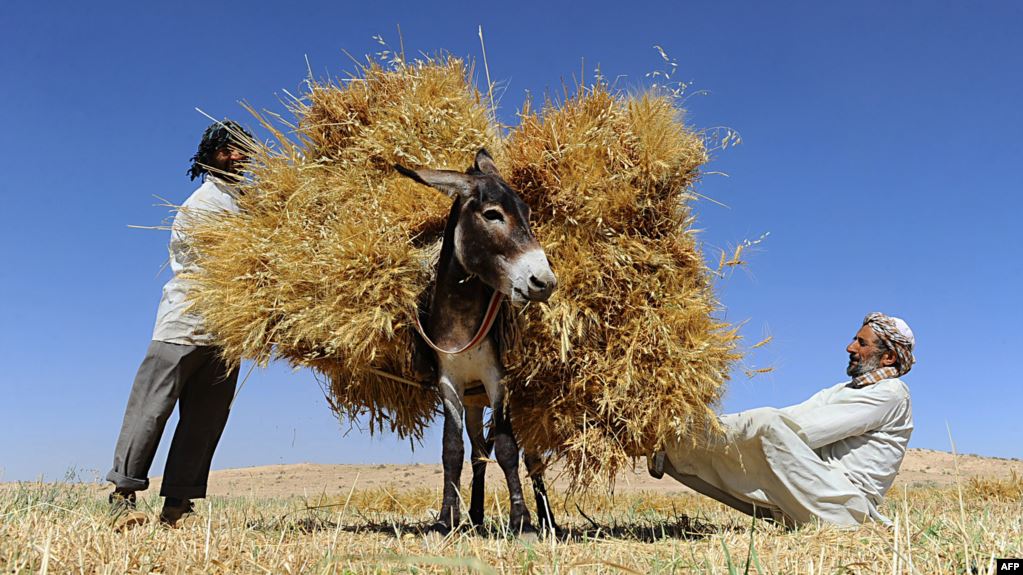پادکست VOA: اصطلاحات انگلیسی – گله pack
سلام با صد و هفدهمین قسمت از مجموعه “Words and Their Stories” (کلمات و داستان آن ها) از سری پادکستهای VOA در خدمت شما هستیم. این مجموعه پادکست به توضیح اصطلاحات رایج زبان انگلیسی، داستان ایجاد شدنشون و نحوه استفاده از آن ها در مکالمه می پردازه. در این قسمت از پادکست VOA: اصطلاحات انگلیسی – گله pack قراره با کاربرد، تاریخچه و معنی چند اصطلاح مرتبط با “pack” (گله حیوانات) مثل “run with a pack” (با گله دویدن!) آشنا بشی. در کنارش چندین اصطلاح و کلمه ی جالب و کاربردی دیگه هم یاد میگیری که لیست بعضی از این کلمه ها به همراه معنی اون ها در پایان مطلب قرار گرفته.
اصطلاح “run with a pack” (با گله دویدن!) یعنی به گروه وابسته بودن. عبارت “pack mentality” (ذهنیت گله ای) یعنی موقعیتی که همه مثل هم فکر می کنن. سردسته گروه رو میگن “leader of the pack” که این آدم همه تصمیم های گروه رو میگیره: “calling the shots“. حالا کسی که ترجیح میده تنهایی کار کنه بهش میگن “a lone wolf” (گرگ تنها).
VOA – Words and Their Stories – 117: The Human Side of Pack Animals

متن انگلیسی پادکست VOA: اصطلاحات انگلیسی – گله pack :
Now, the VOA Learning English program Words and Their Stories.
Like many languages, English uses animals in many of its expressions. And there are thousands of kinds of animals. So, when we talk about them, we put them into different groups.
Take, for example, pack animals.
One kind is an animal used to carry packs, or heavy loads. Donkeys and mules are pack animals. We sometimes call these animals beasts of burden because they help to ease the burden of humans.
I’ll never be your beast of burden
My back is broad but it’s a’hurting
All I want is for you to make love to me …
Another type of pack animals are the ones that live and hunt in a group, or pack. These include grey wolves and dolphins, just to name a couple.
Running with a pack has many benefits. When animals live in a pack, they work together. There is strength (and safety) in numbers. If you run with a pack, you can depend on others in your group. And there is always someone who has your back, or is ready to fight for you.
We can describe people the same way.
Some like to run with a pack. They like to surround themselves with like-minded people. People can run with a pack that likes the same music, has the same politics or enjoys the same activities.
It is easy to hang out with people who generally agree with you. It is comfortable — maybe a little too comfortable.
This can lead to a pack mentality, a situation where everyone thinks the same. After time you could become resistant to ever disagreeing, fearful of losing your place in the pack.
We also call this groupthink. This is a situation where members of a group feel pressure to always agree. Groupthink results in failures to think critically about an issue, situation or decision.
Groupthink or pack mentality can even be dangerous.
People caught up in a pack mentality do not think for themselves and can make bad decisions. For example, teenagers might start hanging out with other teens who do drugs or commit crimes. So, parents often try to control which pack their child runs with.
With both animals and people, there is usually a leader of the pack.
They told me he was bad, but I knew he was sad.
That’s why I fell for the leader of the pack.
In our human pack, the leader is the one who calls the shots. They make the decisions for the group.
Some people, however, have no desire to run with a pack. They might be ahead of the pack and are more forward thinking. They do not want to go along with what everyone else is doing. Maybe they are just faster! Or perhaps they simply enjoy the life of a lone wolf.
As a lone wolf you solve problems by yourself. You do not ask for help when making decisions. You are free from pleasing a group. However, you might not have many friends. After all, everything has a cost.
Now, we finish our show with yet another type of pack animal – the pack rat.
This is a small rodent of western North America. Pack rats have large cheek pouches, where they store food and other things. These pouches can fill up fast!
In the human world, pack rats are people who keep things that they do not need. They store them, not in their cheeks, but in their homes, garages and other storage places. A pack rat often says things like, “I can’t throw it out. I might it need it someday.”
When pack rats collect too much stuff and it interferes with their life — they have become a hoarder. Hoarders have a difficult time throwing anything away. So, they usually find themselves surrounded by stuff, sometimes even buried under it!
However, sometimes it pays to be a pack rat or at least to know one. One day you just may need something they have collected – a 40-year-old newspaper, a bicycle wheel, or a cow bell. One look in a pack rat’s basement or garage and you just might find what you need!
لیست واژگان پادکست VOA: اصطلاحات انگلیسی – گله pack
beast (جانور) – n. an animal under human control
burden (بار) – n. something oppressive or worrisome : the bearing of a load —usually used in the phrase beast of burden
strength (استحکام – قدرت) – n. the quality that allows someone to deal with problems in a determined and effective way
comfortable (راحت) – adj. allowing you to be relaxed : causing no worries, difficulty, or uncertainty
teenager (نوجوان) – n. a young person between 13 and 19 years old
fall for (افتادن برای) – phrasal verb to fall in love with; become infatuated with
pouch (کیسه) – n. a pocket of folded skin especially for carrying the young (as on the abdomen of a kangaroo) or for carrying food (as in the cheek of a hamster)
hoarder (احتکار کننده) – n. someone who collects things in their home obsessively, including things that would commonly be thrown away: bags, old food, or broken items
cling (چسبیدن) – v. to hold onto something or someone very tightly
امیدوارم از پادکست VOA: اصطلاحات انگلیسی – آرزوی سال نو لذت برده باشید. برای دسترسی به قسمت های دیگر این پادکست می توانید از صفحه ی پادکست VOA: اصطلاحات انگلیسی آکادمی مجازی آموزش زبان ۲۴talk دیدن کنید.
همچنین برای گوش دادن به پادکست های سطح بندی شده British Council می توانید به صفحه ی پادکست British Council آکادمی مجازی آموزش زبان ۲۴talk یا برای گوش دادن به پادکست های BBC به صفحه ی پادکست ۶ دقیقه انگلیسی (BBC) آکادمی مجازی آموزش زبان ۲۴talk مراجعه کنید.
گوش دادن به پادکست روش خوبی برای تقویت مهارت شنیداری و هم چنین یادگرفتن کلمات در بستر یک موضوع خاصه که این به تقویت مهارت مکالمه انگلیسی نیز کمک زیادی می کنه.
اگه دنبال این هستی که مهارت های مکالمه زبان انگلیسیت رو بیشتر از این تقویت کنی بهت پیشنهاد میکنم در دورهی مکالمه زبان انگلیسی آکادمی مجازی آموزش زبان انگلیسی ۲۴talk شرکت کنی که با یه برنامه منسجم و خلاقانه کمک میکنه در زمان کوتاه بتونی به راحتی و روانی انگلیسی صحبت کنی.







